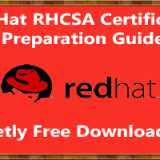Basic Linux Commands For Absolute Beginners
Basic Linux commands for absolute beginners. The Red Hat Certified System Administrator (RHCSA)
- Understand and use essential tools for handling files, directories, command-line environments, and documentation
- Operate running systems, including booting into different run levels, identifying processes, starting and stopping virtual machines, and controlling services
- Configure local storage using partitions and logical volumes
- Deploy, configure, and maintain systems, including software installation, update, and core services
- Manage users and groups, including the use of a centralized directory for authentication
- Manage security, including basic firewall and SELinux configuration
RHCSA Course Basics
- RHCSA Certification Course Overview
- Setup Linux Lab using your Desktop
- Introduction to the Linux Operating System
- Download ISO and Centos7 Installation Guide
- Getting Started with Linux Basic Commands
Basic Linux Commands for Absolute Beginners
- Alias Command Linux | Create Shortcuts for Long Commands
- awk Command | Powerful Text Manipulation Tool
- Crontab Command 15 Cronjob Scheduling Examples in Linux
- Curl Command | Send and Receive Files From Server
- Find Command | Search Files and Directory in Linux
- Firewallcmd command | Firewall Using FirewallD on CentOS 7
- Fdisk Command | Fixed Disk | Format Disk Manage Disks & Partitions
- Grep Command | 15 Amazing Practical Examples
- Hostname Command | How To Assign and Change Host name in RHEL 7
- dig Command | Troubleshoot DNS record Issues
- tr Command in Linux/Unix
- chage command | Enforce Users To Change Passwords Frequently
- cpio command | Find and Archive the Files & Directory Tree
- dd Command | Create HDD Image Backup and Restore
- head command | tail command To check Log Files | Linux Tutorial
- File Globing in Linux | Wildcards To Fetch Data
- chmod command | Modify Files & Directory Permissions
- du Command | Disk utilization analyze
- file command to determine any file type
- history command | Remember Commands Like Pro
- diff Command | Compare Multiple Files Content
- cut command in Linux | Trim Text As You Like
- free command | Check System Memory Usage to identify Performance Issues
- chgrp command | Change Group Ownership Of Files and Directories
- df Command | Disk File System Usage Report
- Linux commands: id Command | print real and effective user and group IDs
- at command Linux
- date Command | Convert Date & Time As Per Timezone
- cat command | Concatenate files and print on the standard output
- chown command | Change User Group Ownership of Files and Directories
- Linux commands: chattr command to protect files & directories from accidental deletion
- cd command | Change the current directory to dir
- bc Command | An arbitrary precision calculator language
- expr command | Evaluate Expressions in Linux
- cp Command | Copy Files & Directories and Create Soft & Hard Links
- Linux commands: ifconfig command | To See Interface Details
- cal command | To View Calendar of Any Year
- arp command Linux
Few More Basic Linux Videos
- 25 Basic Linux Commands Commonly Used in Daily Tasks RHCSA
- Linux User Administration RHCSA Certification Guide
- Modify Linux User Properties and Set Password Age Policy
- YUM Repository Configuration RHEL 7 Step by Step Guide
- Creating Linux Groups and Securing them with Password RHCSA
- Linux File Permissions umask Explained RHCSA
- ACL Access Control List Linux Permissions RHCSA
- Special File Permissions Linux SUID, SGID and Sticky Bit Tech Arkit
- Sudo User Configuration Deep Dive sudoers visudo Tech Arkit
- Linux Disk Partitioning Creating Standard Partitions RHCSA Tech Arkit
- How to Delete Standard Partitions in Linux Tech Arkit
- LVM Logical Volume Manager Creating Logical Volumes RHCSA
- lvextend Extending Logical Volume Size nondisruptively RHCSA
- lvreduce How to Reduce LVM Size without Loosing data
- How to Get Help From Linux Command Line and Man Pages RHCSA
- OpenSSH Secure Shell Server and Client Configuration RHCSA
- Syslog Server Analyzing and Storing Logs RHCSA
- Archiving and Compressing files and Directories tar RHCSA
- RPM Red Hat Package Manager Install/Remove/Upgrade/Query Software&
- Crontab and at Commands Automating Regular Tasks
- ps Listing and Managing Linux Process RHCSA
- Access Linux machine using GUI and CLI1
Detailed Explanation of each command with examples
- Linux Directory Structure Amazing way to understand
- Linux Basics Linux basic commands
- Basic Commands touch, cat, ls, cd, date, cal and pwd
- Copy, Remove, Move and Time Commands
- diff and grep command with regular expressions
- Head, tail, sort and more commands How to check logs using these commands
- tr and wc command Count file characters, lines and words
- Linux Disk Utilities to get required information
- Getting Help from Command Line Interface
- w, who, hostname, hostnamectl and uname commands
- Find and locate command to search for files and directories
- top command analyzing system performance
- Text Editors Nano and Vi
- sed, awk, vmstat, netstat and mail
Related Articles
Thanks for your wonderful Support and Encouragement
- Get Email | Download E-Books
- Facebook Page
- Youtube Channel
- Exclusive Telegram Group
- Discuss On WhatsApp Group







Thanks for sharing 😉